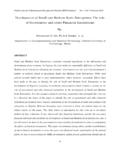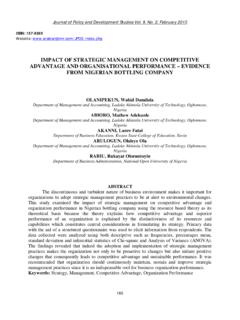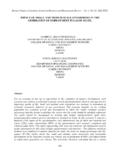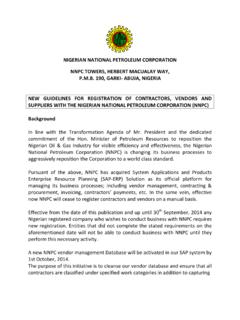Transcription of THE NIGERIANA CIVIL SERVICE AND PROMOTION …
1 Arabian Journal of Business and Management Review (OMAN Chapter) Vol. 1, ; April 2012 12 THE NIGERIANA CIVIL SERVICE AND PROMOTION OF SUSTAINABLE HUMAN DEVELOPMENT: A CRITICAL ANALYSIS 1 Nwanolue, , ( , FRHD) Senior Lecturer, Department of Political Science, Anambra State University, Uli, Nigeria 2 Iwuoha Victor Chidubem Doctoral Researcher, Department of Political Science, University of Nigeria, Nsukka, Nigeria Abstract The concept of human development in a developing country like Nigeria has consistently posed serious challenges since 1960 to date. The quest for procedural rationality as a basis for organizing and executing government activities has been consistently articulated with respect to the pursuit of public administration in a democratic dispensation. This paper examines the extent to which the nigerian CIVIL SERVICE has promoted sustainable human development over the years. This entails focusing on the theoretical examination of sustainable human development as well as the challenges of governance and bureaucracy.
2 Methodologically, this paper is based on documentary analysis of relevant records. The need for the bureaucracy to be effective in promoting sustainable human development is underscored in the paper. Keywords: CIVIL SERVICE , Reforms, Ministries, Appointment, PROMOTION . INTRODUCTION The origin, structure and performance of the contemporary CIVIL SERVICE in Nigeria are highly traceable to colonial administrative formation. CIVIL SERVICE in Nigeria has its origins in organizations established by the British in colonial times. The nigerian CIVIL SERVICE is a body of government employees entrusted with the administration of the country, and mandated to carry out the policies of the government of the day. In other words, it is the body of civilian employees of any level of government, not subject to political appointment and removal, normally hired and promoted largely on the basis of competitive Nigeria gained full independence in October 1960 under a constitution that provided for a parliamentary government and a substantial measure of self-government for the country's three regions.
3 Since then, various commissions have studied and made recommendations for reforming of the CIVIL SERVICE , including the Margan Commission of 1963, the Adebo Commission of 1971 and the Udoji Commission of 1972-74. A major change occurred with the adoption in 1979 of a constitution modeled on that of the United States. The Dotun Philips Panel of 1985 attempted to reform to the CIVIL SERVICE . The 1988 CIVIL SERVICE Reorganization Decree promulgated by General Ibrahim Babangida had a major impact on the structure and efficiency of the CIVIL SERVICE . The later report of the Ayida Panel made recommendations to reverse some of the past innovations and to return to the more efficient CIVIL SERVICE of earlier The CIVIL SERVICE has been undergoing gradual and systematic reforms and restructuring since May 29, 1999 after decades of military rule. However, the CIVIL SERVICE is still considered stagnant and inefficient, and the attempts made in the past by panels have had little effect on the PROMOTION of sustainable human development in Nigeria.
4 The ministries are responsible for various parastatals (government-owned corporations) such as universities (Education), National Broadcasting Commission (Information) and nigerian National Petroleum Corp (Petroleum). Other parastatals are the responsibility of the Office of the Presidency, such as the Independent National Electoral Commission, the Economic and Financial Crimes Commission and the Federal CIVIL SERVICE Meanwhile, the above development has x-rayed the genealogical administrative setting of nigerian CIVIL SERVICE , from 1960 to date. The central point is that: Have various CIVIL SERVICE reforms that have taken place in Nigeria immensely promoted sustainable human development? Hence, strong human resource management, man power planning and utilization, effective organizational performance, efficient employee-employer relations in a given establishment and high level bureaucratic stability have eluded the post colonial nigerian CIVIL SERVICE , a concomitant damaging effect on the PROMOTION of sustainable human development.
5 Arabian Journal of Business and Management Review (OMAN Chapter) Vol. 1, ; April 2012 13 THE nigerian CIVIL SERVICE The CIVIL SERVICE of any country enjoys efficiency and effectiveness to the extent the government of the day objectively yields to its procedural capacity objectives and bureaucratic stability, geared towards the PROMOTION of sustainable human development. This in no small measure ensures effective nation building and economic stability. The nigerian CIVIL SERVICE , according to Akinyemi is said to be an exception of this For instance, certain administrative confusion has be-clouded the atmosphere of Nigeria s CIVIL SERVICE , especially as regards nomenclatural positions of top CIVIL servants occupying sensitive offices, while in active SERVICE . For instance, until the 1988 reforms, the nigerian CIVIL SERVICE was organized strictly according to British traditions: it was apolitical, CIVIL servants were expected to serve every government in a nonpartisan way, and the norms of impersonality and hierarchical authority were well entrenched.
6 As the needs of the society became more complex and the public sector expanded rapidly, there was a corresponding need to reform the CIVIL SERVICE . The Adebo Commission (1970) and the Udoji Commission (1972) reviewed the structure and orientations of the CIVIL SERVICE to make it more efficient instrument for promoting sustainable human development. Idris affirms that although these commissions recommended ways of rationalizing the CIVIL SERVICE , the greatest problems of the SERVICE remained inefficiency and red Again in 1985, a study group headed by Dotun Phillips looked into the problems. It was believed that the 1988 reforms, the most current measures aimed at dealing with the problems of the SERVICE as of 1990, were based on this report. Compared with the 1960s and 1970s, the CIVIL SERVICE by 1990 had changed dramatically. It had been politicized to the extent that most top officials openly supported the government of the day.
7 The introduction of the quota system of recruitment and PROMOTION , adherence to the federal-character principle, and the constant interference of the government in the day-to-day operation of the CIVIL SERVICE especially through frequent changes in top officials and massive purges--meant that political factors rather than merit alone played a major role in the CIVIL The 1988 reforms formally recognized the politicization of the upper echelons of the CIVIL SERVICE and brought about major changes in other areas. The main stated objective of the reforms was "to ensure a virile, dynamic and result-oriented CIVIL SERVICE geared towards the PROMOTION of sustainable human development of the country". As a result, ministers or commissioners vested with full executive powers were fully accountable for their ministries or commissions. The director general had become a political appointee whose length of tenure was dependent on that of the government of the day; in practice, this meant that directors general needed not be career CIVIL servants; thereby reducing the latter's career prospects.
8 Each ministry had been professionalized so that every official, whether specialist or generalist, made his career entirely in one ministry, whereas previously an official could move among ministries. A new department - the Presidency - comprising top government officials was created at the federal level to coordinate the formulation of policies and monitor their execution, thus making it a clearinghouse between the president and all federal ministries and departments. The reforms created a new style of CIVIL SERVICE , but the structure might change under later governments with different priorities. According to Abdullahi, in the past, the attempt by every government to effect changes in the CIVIL SERVICE produced many Ministries have been constantly restructured, new ones created, and existing ones abolished. Nevertheless, the 1988 reforms might solve some of the problems of the CIVIL SERVICE , because most CIVIL servants tended to remain in their jobs despite reorganizations.
9 Also, the move of the capital from Lagos to Abuja the early 1990s will provide new opportunities to apply the federal-character principle in replacing Lagosian CIVIL servants unwilling to move. The CIVIL SERVICE in 1990 consisted of the federal CIVIL SERVICE , the twenty-one autonomous state CIVIL services , the unified local government SERVICE , and several federal and state government agencies, including parastatals and corporations. The federal and state CIVIL services were organized around government departments, or ministries, and extra ministerial departments headed by ministers (federal) and commissioners (state), who were appointed by the president and governors, respectively. These political heads were responsible for policy matters. The administrative heads of the ministry were the directors general, formerly called permanent secretaries. The "chief" director general was the secretary to the government and until the Second Republic also doubled as head of the CIVIL SERVICE .
10 As chief adviser to the government, the secretary conducted liaison between the government and the CIVIL The major function of the director general, as of all senior CIVIL servants, was to advise the minister or the commissioner directly. In doing so, the director general was expected to be neutral. In the initial periods of military rule, these administrative heads wielded enormous powers. For some time, the military rulers refused to appoint civilian political heads. Even after political heads were appointed, it was years before the era of "super permanent secretaries" to end. According to Bamidele, that happened in 1975 when after Gowon's fall, the CIVIL SERVICE was purged to increase its efficiency. Many of the super permanent secretaries lost Arabian Journal of Business and Management Review (OMAN Chapter) Vol. 1, ; April 2012 14 their jobs, and the subordinate status of permanent secretaries to their political bosses was Another consequence of the purge, reinforced subsequently, was the destruction of the CIVIL SERVICE tradition of security of tenure.















